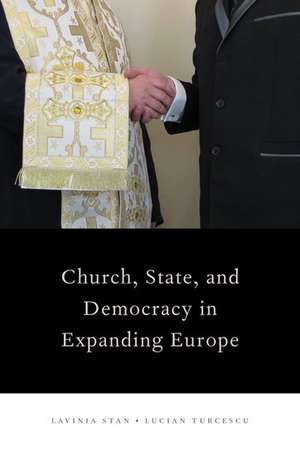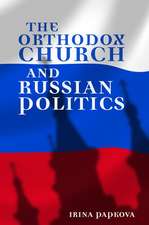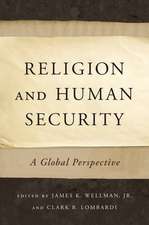Church, State, and Democracy in Expanding Europe: Religion and Global Politics
Autor Lavinia Stan, Lucian Turcescuen Limba Engleză Hardback – 22 sep 2011
Din seria Religion and Global Politics
- 8%
 Preț: 190.80 lei
Preț: 190.80 lei - 27%
 Preț: 340.62 lei
Preț: 340.62 lei - 11%
 Preț: 169.48 lei
Preț: 169.48 lei - 22%
 Preț: 714.20 lei
Preț: 714.20 lei - 30%
 Preț: 758.57 lei
Preț: 758.57 lei - 18%
 Preț: 307.78 lei
Preț: 307.78 lei - 8%
 Preț: 297.06 lei
Preț: 297.06 lei - 27%
 Preț: 407.83 lei
Preț: 407.83 lei - 30%
 Preț: 500.13 lei
Preț: 500.13 lei -
 Preț: 309.38 lei
Preț: 309.38 lei -
 Preț: 303.92 lei
Preț: 303.92 lei - 28%
 Preț: 419.27 lei
Preț: 419.27 lei - 22%
 Preț: 462.87 lei
Preț: 462.87 lei - 10%
 Preț: 243.45 lei
Preț: 243.45 lei - 8%
 Preț: 222.57 lei
Preț: 222.57 lei - 19%
 Preț: 233.72 lei
Preț: 233.72 lei - 18%
 Preț: 215.32 lei
Preț: 215.32 lei - 12%
 Preț: 322.91 lei
Preț: 322.91 lei - 14%
 Preț: 367.77 lei
Preț: 367.77 lei - 30%
 Preț: 553.30 lei
Preț: 553.30 lei - 13%
 Preț: 150.42 lei
Preț: 150.42 lei - 26%
 Preț: 558.74 lei
Preț: 558.74 lei - 30%
 Preț: 660.07 lei
Preț: 660.07 lei - 25%
 Preț: 588.37 lei
Preț: 588.37 lei - 9%
 Preț: 478.50 lei
Preț: 478.50 lei - 13%
 Preț: 558.34 lei
Preț: 558.34 lei
Preț: 524.48 lei
Preț vechi: 749.56 lei
-30% Nou
Puncte Express: 787
Preț estimativ în valută:
100.37€ • 104.40$ • 82.86£
100.37€ • 104.40$ • 82.86£
Carte tipărită la comandă
Livrare economică 02-08 aprilie
Preluare comenzi: 021 569.72.76
Specificații
ISBN-13: 9780195337105
ISBN-10: 0195337107
Pagini: 304
Dimensiuni: 239 x 163 x 28 mm
Greutate: 0.64 kg
Editura: Oxford University Press
Colecția OUP USA
Seria Religion and Global Politics
Locul publicării:New York, United States
ISBN-10: 0195337107
Pagini: 304
Dimensiuni: 239 x 163 x 28 mm
Greutate: 0.64 kg
Editura: Oxford University Press
Colecția OUP USA
Seria Religion and Global Politics
Locul publicării:New York, United States
Recenzii
The book is well researched, and the authors appeal to a variety of sources and to a multitude of methods of both data analysis and interpretation The strong point of their analysis is their reading of the interaction of religion and politics at the legislative level Stan and Turcescu both offer a valuable working tool and provide scope for future research on post-communist countries.
a welcome addition to the growing literature in this field, shedding light on the ten newest members of the EU and examining how interactions between law and religion have changed following the fall of Communism.
Stan and Turcescu are to be commended for making available, in a highly readable work, the contents of this critical debate inside the EU. The book will appeal to anyone interested in the intersection of religion, statehood, nationalism and civil society among the newer members of the EU. It may also be beneficial to those interested in the legacy of repressive governments during World War II and subsequent communist regimes on a countryâs culture of civil and religious intolerance.
a welcome addition to the growing literature in this field, shedding light on the ten newest members of the EU and examining how interactions between law and religion have changed following the fall of Communism.
Stan and Turcescu are to be commended for making available, in a highly readable work, the contents of this critical debate inside the EU. The book will appeal to anyone interested in the intersection of religion, statehood, nationalism and civil society among the newer members of the EU. It may also be beneficial to those interested in the legacy of repressive governments during World War II and subsequent communist regimes on a countryâs culture of civil and religious intolerance.
Notă biografică
Stan: Assistant Professor of Political Science, Concordia University and Director of the Center for Post-Communist Studies, St. Francis Xavier University













